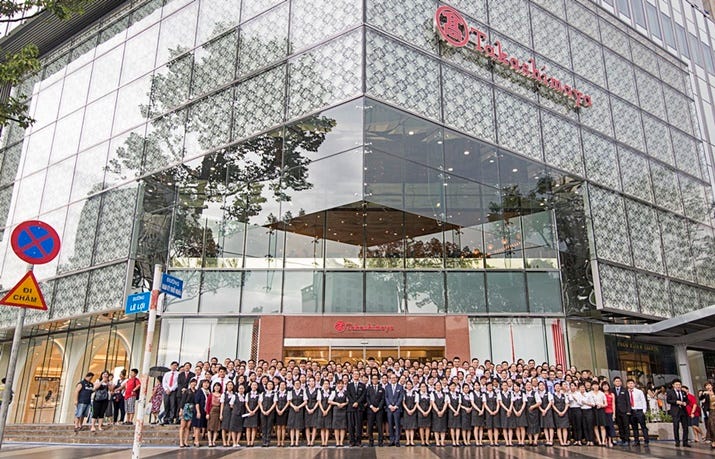Asia's Economic Crossroads: Growth, Expansion, and Opportunity
From Thailand’s reforms to dismantle monopolies and spur competition to Vietnam’s rising prominence as a manufacturing and investment hub, Southeast Asia is emerging as a hotspot for economic activity and global business strategies. Jollibee Foods Corp. is accelerating its Vietnam expansion as part of its global ambitions, while Japanese firms plan significant growth in the region, drawn by Vietnam’s booming domestic demand and export potential. Meanwhile, Citigroup highlights Southeast Asia’s strategic appeal for diversifying supply chains, with Indonesia, Malaysia, and Vietnam leading in metals, industrial parks, and tech manufacturing. As China contends with sluggish domestic demand and global trade barriers, the region’s dynamism positions it as a focal point for businesses seeking growth, stability, and innovation in an evolving economic landscape.
China’s Export Surge: Racing the Clock Against Tariffs
China’s exports surged nearly 7% to US$312 billion in November 2024, driven by a race to ship goods to the US before new tariffs tied to Donald Trump’s return to the White House take effect on January 20, 2025. Exports to the US hit their highest since 2022, with many firms routing products through Southeast Asia to bypass looming trade barriers. This export boom underscores China’s reliance on overseas markets amid persistently weak domestic demand, reflected in a surprising 4% drop in imports. Economists warn that the trade imbalance and deflationary pressures could provoke more global tariff measures, even as Beijing pledges stronger fiscal and monetary policies to stimulate consumption. While government stimulus has boosted manufacturing sectors like EVs (electric vehicles) and solar, the broader economy faces mounting challenges as it contends with low consumer confidence and a property crisis.
Citigroup Eyes Booming Opportunities in Southeast Asia

Citigroup is capitalizing on double-digit growth in client activity across Southeast Asia’s trade corridors, driven by the region’s stability, strategic location, and skilled workforce, according to corporate banking co-head Jason Rekate. The area has emerged as a prime destination for businesses diversifying supply chains amid global tensions. Rekate highlighted Indonesia’s burgeoning metals sector, Malaysia’s push for industrial parks, and Vietnam’s prominence in tech manufacturing as key opportunities. Technology and automotive industries are particularly vibrant, with clients rethinking production strategies to leverage Southeast Asia’s potential as a global manufacturing hub.
Jollibee’s Global Recipe for Success: Vietnam as a Growth Catalyst

Jollibee Foods is doubling down on its Vietnam expansion, celebrating its 200th outlet in the country and aiming for 300 “very soon,” as it strives to rank among the world’s top five restaurant companies by market capitalization. Vietnam, with the most Jollibee stores outside the Philippines, serves as a testbed for the Filipino fast-food giant’s global ambitions, which include dominating the quick-service restaurant market and diversifying through brands like Highlands Coffee and the recently acquired Compose Coffee. Despite challenges in China, Jollibee is focusing on the US and other key markets while targeting a threefold increase in after-tax income by 2028.
Vietnam Tops Japanese Firms’ Expansion Plans in Southeast Asia
Over 56% of Japanese firms in Vietnam plan to expand within the next two years, the highest rate among Southeast Asian countries, according to a Japan Trade Promotion Organization survey. Despite a slight decline from last year, Vietnam surpassed Laos as the top market for expansion, with strong growth projected in retail, food services, and non-manufacturing sectors. Japanese companies are drawn by Vietnam’s rising domestic demand and robust export potential, with 64.1% anticipating profitability in 2024 — the first time in five years this figure has exceeded 60%. Salaries in Vietnam are growing rapidly, with a projected 5.4% hike this year, reflecting the country’s competitive yet evolving labor market. Japan remains a key investor in Vietnam, ranking fifth among foreign investors with US$3.61 billion in 2024, solidifying the country’s role as a strategic hub for Japanese business growth.
Thailand’s Youngest Leader Tackles Monopolies and Economic Inequality
Thai Prime Minister Paetongtarn Shinawatra, the nation’s youngest premier at 38, has vowed to dismantle monopolies in key industries like rice exports and liquor production to foster competition and support small businesses. In a televised address marking her first 90 days in office, Paetongtarn outlined a bold agenda that includes amending outdated laws, lowering power tariffs, and introducing affordable housing initiatives. Her administration’s flagship digital wallet program, alongside cash handouts for millions of citizens, aims to boost consumption and revive growth in Southeast Asia’s second-largest economy, which has lagged behind regional peers. With plans to curb household debt, tackle air pollution, and implement integrated water management, Paetongtarn is positioning her government as a champion of economic reform and inclusivity, echoing her family’s political legacy.

SeA (Southeast Asia) Focus Portfolio Performance Update:
From its inception on December 20, 2023, to November 29, 2024, the portfolio, which invests in the highest-quality and fastest-growing businesses in Southeast Asia at attractive prices, delivered a total return of 40.7%, outperforming all Southeast Asian country index funds.
Follow the portfolio here.






